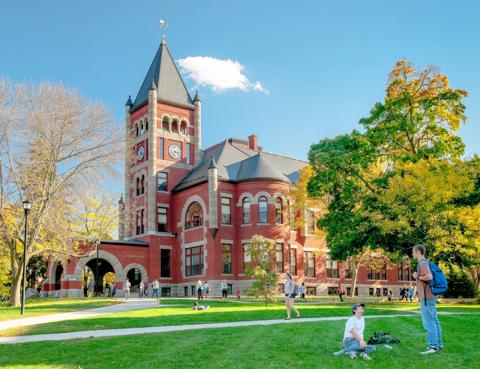The online Substance Use Disorders Graduate Certificate program is designed to guide you through best practices for a holistic approach to treatment of drug and alcohol abuse. With extensive field expertise, our faculty teaches the core functions of addiction counseling applicable to a wide range of workplace settings.
Credit Hours: 12 | Program Length: 4 months | Tuition Cost
Current UNH students enrolled in the University of New Hampshire's Master of Social Work (MSW) program interested in this certificate may file an internal application with the Graduate School - with no application fee. Please contact the program director for additional details.
WHY GET A GRADUATE CERTIFICATE IN SUBSTANCE USE DISORDERS?
The substance use disorders (SUD) graduate certificate helps students meet a staggering need in today’s society. You’ll develop the competencies aligned with the core functions and practice dimensions of addiction counseling as outlined by the New Hampshire Board of Licensing for Alcohol and Other Drug Use Professionals, including intake, assessment, treatment planning, case management, referral, crisis intervention, record keeping and individual, group and family counseling. You’ll learn the etiology of addictions, policy analysis, research, best practices, system theory and strengths perspective. This certification program fosters understanding of drug and alcohol abuse, providing you with the skills needed to treat your clients.
WHY CHOOSE UNH FOR YOUR DEGREE?
At UNH you will be supported by a productive faculty as you advance your career. Social work faculty members serve as evaluators on many community-based projects in health and human service agencies in the area. The program welcomes graduate students, students and professionals from a variety of backgrounds. Courses are offered at the UNH Durham as well as at the Manchester campus during evenings and weekends, with one course available online. The student-run organization Graduate Students of Social Work (G.S.S.W.) promotes professional growth and development by providing a voice for our colleagues and leadership in the community.
POTENTIAL CAREER AREAS
- Correctional facilities
- Disorder treatment agencies
- Government social services
- Halfway houses
- Hospitals
- Military/veterans programs
- Nonprofit agencies
- Outpatient/inpatient facilities
- Schools
- Workplace treatment programs
From the CHHS Blog
Curriculum & Requirements
About the Program
The Substance Use Disorders Graduate Certificate provides students with general and specific knowledge as well as skill building towards the development of this important practice specialty. Areas of study include: intake, assessment, treatment planning, case management, referral, crisis intervention, and the counseling of individuals, groups and families.
For additional information regarding the substance use disorder course requirements, contact our admissions team at unh.socialwork@unh.edu.
Who Should Apply?
- Graduate students attending the University of New Hampshire Durham, Manchester, or Online.
- Students from other disciplines and other universities, and non-matriculated students.
- Students placed in a substance use disorders treatment program for their internship or practicum, and needing further knowledge and skills.
- Individuals pursuing continuing education units (CEU) for a variety of state licenses.
- Social service workers from substance use disorder and co-occurring disorder treatment agencies, hospitals, schools, judicial/correctional facilities, military/veteran programs.
- Individuals interested in increasing their knowledge in substance use disorders and developing specialized practice skills.
Contact Information
For additional information regarding the substance use disorder course requirements, contact our Substance Use Disorder certificate coordinator, Meredith Young. meredith.young@unh.edu
Certificate Requirements
The Substance Use Disorders Graduate Certificate consists of 12 credit hours acquired through two required courses covering assessment, treatment and system theory and strengths perspectives of addiction and two other electives listed below.
Students are required to complete the following social work courses in no particular order:
| Code | Title | Credits |
|---|---|---|
| Required Courses | ||
| SW 816 | Addiction Assessment | 3 |
| SW 819 | Addiction Treatment | 3 |
| Electives | ||
| Select two courses from the following: | 6 | |
SW 817 | Understanding Suicide | |
SW 860 | Research Methods in Social Work 1 | |
SW 870 | Intimate Partner Violence | |
SW 871 | Trauma-Informed Practice in School Settings | |
SW 897 | Special Topics in Social Work and Social Welfare (Leadership in Child Welfare) | |
SW 897 | Special Topics in Social Work and Social Welfare (Social Work and the Military) | |
SW 897 | Special Topics in Social Work and Social Welfare (Forensic Mental Health) | |
| Total Credits | 12 | |
- 1
Please note that if a student already completed SW 860 Research Methods in Social Work, that student will be allowed to substitute SW 965 Program and Practice Evaluation. For students taking a Research Methods course, their completion will be tracked through the Certificate Designation Form.
* Other substance use disorder related electives may be considered with the approval from the certificate coordinator.
Deadline
Applications must be completed by the following deadlines in order to be reviewed for admission:
- Fall: August 1
- Spring: December 1
- Summer: April 15
- Special: N/A
Application fee: $25
Campus: Manchester
New England Regional: No
Accelerated Masters Eligible: No
New Hampshire Residents
Students claiming in-state residency must also submit a Proof of Residence Form. This form is not required to complete your application, but you will need to submit it after you are offered admission, or you will not be able to register for classes.
Transcripts
If you attended UNH or Granite State College (GSC) after September 1, 1991, and have indicated so on your online application, we will retrieve your transcript internally; this includes UNH-Durham, UNH-Manchester, UNH Non-Degree work and GSC.
If you did not attend UNH, or attended prior to September 1, 1991, then you must upload a copy (PDF) of your transcript in the application form. International transcripts must be translated into English.
If admitted, you must then request an official transcript be sent directly to our office from the Registrar's Office of each college/university attended. We accept transcripts both electronically and in hard copy:
- Electronic Transcripts: Please have your institution send the transcript directly to grad.school@unh.edu. Please note that we can only accept copies sent directly from the institution.
- Paper Transcripts: Please send hard copies of transcripts to: UNH Graduate School, Thompson Hall- 105 Main Street, Durham, NH 03824. You may request transcripts be sent to us directly from the institution or you may send them yourself as long as they remain sealed in the original university envelope.
Transcripts from all previous post-secondary institutions must be submitted and applicants must disclose any previous academic or disciplinary sanctions that resulted in their temporary or permanent separation from a previous post-secondary institution. If it is found that previous academic or disciplinary separations were not disclosed, applicants may face denial and admitted students may face dismissal from their academic program.
Letters of Recommendation: 2 Required
Recommendation letters submitted by relatives or friends, as well as letters older than one year, will not be accepted.
Personal Statement/Essay Questions
Prepare a brief but careful statement regarding:
- Reasons you wish to do graduate work in this field, including your immediate and long-range objectives.
- Your specific research or professional interest and experiences in this field.
Important Notes
All applicants are encouraged to contact programs directly to discuss program-specific application questions.
International Applicants
Prospective international students are required to submit TOEFL, IELTS, or equivalent examination scores. English Language Exams may be waived if English is your first language. If you wish to request a waiver, then please visit our Test Scores webpage for more information.
This program is normally not available to international applicants who are currently living outside of the U.S.
Explore Program Details
Tuition & Fees:
The University of New Hampshire’s online graduate tuition and fees information is available on the UNH Business Services Website. Program costs and technology fees are subject to change.
Course Fees: Specific courses may have additional course fees. Visit the course schedule for more information.
Financial Aid:
Federal Unsubsidized Direct Loans are a form of federal financial aid available to Graduate Students. To apply, you must complete the Free Application for Federal Student Aid (FAFSA).


























